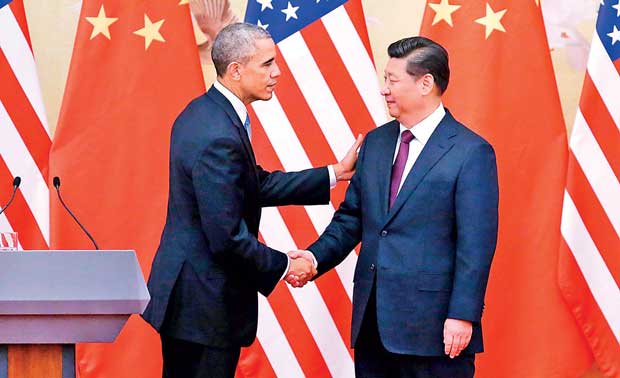29 Sep 2016 - {{hitsCtrl.values.hits}}

 Ahead of the G20 Summit in Hangzhou this month, the US and China jointly announced that they will ratify the Paris Climate Change Accord agreed to in 2015. But even with ratification, the Paris agreement places no legally binding obligation on countries to reduce their emissions.
Ahead of the G20 Summit in Hangzhou this month, the US and China jointly announced that they will ratify the Paris Climate Change Accord agreed to in 2015. But even with ratification, the Paris agreement places no legally binding obligation on countries to reduce their emissions.
In this context, the plans by both countries to limit their emissions are essentially voluntary. This may seem counter-intuitive. We have all heard the refrain that the climate is a global public good that requires all nations to act together to protect it. In other words, we should not take unilateral action and incur the costs if other nations do not pull their weight and act too.
However, the US and China have been acting unilaterally for some time now. In a new paper published in Global Policy, Peter Drahos and I argue that not only is there a strong economic and moral case for such action, but there are good geopolitical reasons too.
But first, what actions are the US and China taking?
In recent years both countries have undertaken a series of unilateral measures to cut emissions.
In the US, unilateral action has been a feature of the Obama administration. In 2009, it began negotiations with the major car manufacturers over fuel efficiency and carbon pollution standards — standards that now cover the entire industry. In 2013, Obama outlined the Clean Power Plan, which sets carbon pollution standards for the existing power plants in order to reduce the sector’s emissions 30 percent by 2030.
This doesn’t include the raft of other measures undertaken by state governments, with 20 states now having set emissions targets. California has put in place targets to reduce greenhouse gas emissions to 1990 levels by 2020 — a target it is on track to meet. The state then plans to cut emissions to 40 percent below 1990 levels by 2030 and 80 percent below 1990 levels by 2050.
China has also taken a unilateral path. Its 12th Five-Year Plan (2011–2015), the ‘greenest’ in history, has set nation-wide targets to improve energy intensity, decrease carbon intensity and increase the share of non-fossil fuels in the economy. China has also initiated a series of pilot emissions trading schemes, all aimed at reducing its contribution to climate change.
The Five-Year Plan has also set targets to reduce the nation’s reliance on coal, which currently underpins the Chinese energy sector. This includes measures to increase gas production and close down old and inefficient coal plants.
In 2013, China announced that it would ban the construction of new coal-fired power plants in the Beijing, Shanghai and Guangdong regions. The most recent data out of China indicates that coal consumption likely peaked in 2014 and may now decline.
Because we tend to think of climate change as a global collective action problem, it may seem irrational to argue that there are geopolitical reasons for countries, such as the US and China, to go it alone. Yet there is an increasing recognition among policymakers that climate change poses serious geopolitical challenges. In 2014, the US Department of Defence warned that climate change will increase the risk of conflicts over water, food and other resources. Scientific studies suggest that a world that is two degrees warmer will be a world of crises.
It is unknown when the increase in the frequency and severity of natural disasters will usher in an era of climate mobilisation. But nations that are seen as leaders during times of crisis are likely to receive geopolitical benefits. A state that has acted in anticipation of crisis has more chance of being followed by other states than being a follower. And it has more chance of being a rule-setter rather than a rule-taker. In this position, a state has a much better chance of shaping global responses to climate interests in ways that attend to its other interests, such as sovereignty and domestic stability.
Reflecting on his climate legacy this month, Obama hinted that ‘there are certain things that the United States can do by itself … but if we’re going to actually solve a problem, then our most important role is as a leader, vision setter and convener’.
With the US and China together responsible for about 44 percent of global greenhouse gas emissions, the more both countries do now, the more geopolitical sway they are likely to have as the climate crisis unfolds. Doing so will only enhance international cooperation efforts, which though unlikely to solve the crisis on their own, provide critical momentum for domestic actions.
(Courtesy East Asia Forum)
(Christian Downie is a Vice Chancellor’s Postdoctoral Fellow at the University of New South Wales and a Visiting Fellow at the Australian National University)
10 Jan 2025 1 hours ago
10 Jan 2025 1 hours ago
10 Jan 2025 2 hours ago
10 Jan 2025 3 hours ago
10 Jan 2025 3 hours ago